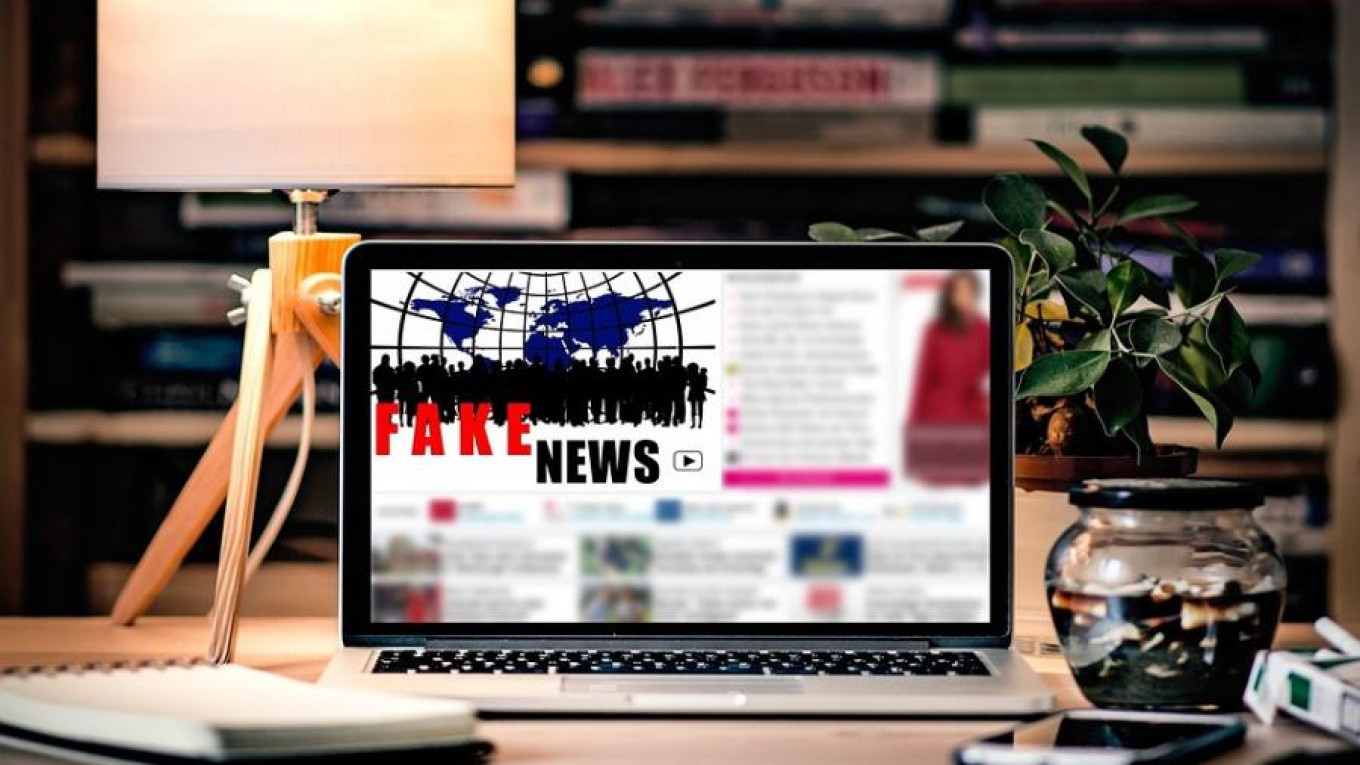“Fake news” as a counterargument to any criticism is in vogue these days in Russia. Like Donald Trump and his supporters shouting on Twitter about whatever's published by The New York Times or aired on CNN, Russian officials at all levels of government are in love with hating fake news.
For example, Russia’s Foreign Ministry recently launched a web page where it claims to debunk “false information about Russia” by stamping the word “FAKE” in bold, red letters across screenshots of offending news articles.
Similarly, the Kremlin’s foreign propaganda television network, RT, now has a website called “FakeCheck,” which supposedly discredits stories by turning them into quizzes with “correct answers,” such as, “Julian Assange has no ties to the Kremlin.”
As Russia’s prime minister faces new allegations that he controls a vast empire of illicit real estate, members of the parliament refuse to call for an investigation, saying the accusations against Dmitry Medvedev are nothing more than “fake news.”
A tradition of trickery
In Russia, screaming “fake news” as a response to any criticism has an older relative in “whataboutism” — a rhetorical fallacy favored by both Soviet and modern Russian propaganda, where Moscow’s actions are justified by references to real or perceived crimes and slights by the Kremlin’s foes abroad.
“You say Russia invaded Ukraine?” “But what about the 2003 invasion of Iraq!”
In many cases, the criticism isn’t unfounded, but Russia is essentially saying, “You’re doing it, so it’s okay for us, too.”
Asking reporters things like, “You think our country is so innocent?” Donald Trump has turned whataboutism on its head, undermining his own country’s claim to moral superiority. Trump uses the same tactic Vladimir Putin often employs against the U.S.
Using the term “fake news” to deflect criticism is hardly the first time Russian officials have adopted questionable rhetoric and practices from the West to justify unpopular moves at home and abroad.
Seldom do you hear Russian lawmakers refer to China or Saudi Arabia, when proposing repressive legislation. No, they’re far more likely to cite the real or invented “progressive” steps taken by governments in the West.
Vladimir Putin was elected to his third presidential term in 2012, amid months of anti-authoritarian protests against the results of parliamentary elections the year before, when Putin’s party, United Russia, predictably won big.
When Putin was again comfortably settled in the Kremlin, his loyalists began to cast a wide net of new, repressive measures to preempt future dissent. Since then, most of these initiatives have, to some extent, quoted “foreign experience,” as a way of shutting down Russia’s West-leaning opposition.
For example, take one of the first and the most notorious pieces of legislation introduced shortly after Putin’s inauguration in 2012, when United Russia deputy Alexander Sidyakin introduced a bill that would place much harsher fines on people who organize public demonstrations.
Strangely, Sidyakin claimed that his legislation was modeled in part on similar laws in Switzerland and Sweden, two of the most democratic nations in the world. When a Russian reporter reached out to police commissioners in these countries, they denied that any such laws exist there.
Of course, Russian lawmakers also draw on real practices in the West, like the UK’s Investigative Powers Act, also known as the Snoopers’ Charter, which the State Duma has used to justify “tightening the screws” on Russian Internet freedoms.
Borrowing the worst
The scourge of moral crisis is another reverse-engineered bogeyman. In fact, Russia is in the grips of a moral panic right now: there’s an epidemic of teenage suicides orchestrated by insidious online “death groups” busy “hypnotizing” teens, if Russian officials and the state-controlled media are to be believed.
Of course, police statistics say fewer than 1 percent of the few hundred teenage suicides last year can be attributed to the direct influence of the Internet.
Americans who remember politicians blaming video games and rap music for violent crimes will recognize this hysteria: first, the mass media amplifies a dubious, vaguely sourced idea about rumored behavior among youths. Then there’s a flurry of panicked coverage, featuring self-declared experts confirming the latest dangerous trend. Nervous parents demand action from the government, and lawmakers looking to score easy political points toss out hamfisted, populist legislation.
Sober analysis swirls down the drain, and the whole process repeats when the news cycle moves on to the next catastrophe.
As “fake news” stonewalling seeps deeper into Russian politics, nearly any discussion risks absurdity. For instance, Ufa, the capital city of the Russian republic of Bashkortostan, has been in the headlines this winter because the local authorities consistently fail to clear the streets of snow. With dirty ice piling high throughout the city, Ufa’s mayor has ludicrously insisted that the story is “fake news” purveyed by an unscrupulous media.
Ostensibly, Russian officials’ whataboutism and their penchant for calling the Western media “fake news” are meant to declare Moscow’s opposition to Europe and America. Seen another way, however, parroting the West’s most nonsensical, authoritarian, and corrupt practices reveals a deep desire to share something with these foreigners. Unfortunately, the people in the Russian government seem happy to settle for the lowest common denominator.
A Message from The Moscow Times:
Dear readers,
We are facing unprecedented challenges. Russia's Prosecutor General's Office has designated The Moscow Times as an "undesirable" organization, criminalizing our work and putting our staff at risk of prosecution. This follows our earlier unjust labeling as a "foreign agent."
These actions are direct attempts to silence independent journalism in Russia. The authorities claim our work "discredits the decisions of the Russian leadership." We see things differently: we strive to provide accurate, unbiased reporting on Russia.
We, the journalists of The Moscow Times, refuse to be silenced. But to continue our work, we need your help.
Your support, no matter how small, makes a world of difference. If you can, please support us monthly starting from just $2. It's quick to set up, and every contribution makes a significant impact.
By supporting The Moscow Times, you're defending open, independent journalism in the face of repression. Thank you for standing with us.
Remind me later.








